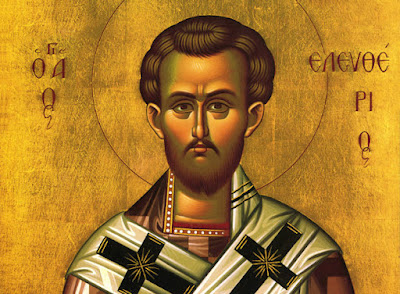Feast Day of Agios Eleftherios
On December 15 the Greek Orthodox Church commemorates the Feast Day of Agios Eleftherios, the Patron Saints of expectant mothers and of childbirth.
Eleftherios was among the first and youngest to carve a niche for himself in Christianity in the eternal city of Rome, where he astounded his elders with his prodigious intellect and early development.
This wonder saint was the son of noble and prominent parents. He was born in Rome, where his father was an official in the imperial service, though he died in the saint’s childhood. His mother, Anthia, had heard the Gospel from Saint Paul and was, in fact, baptized by him. Given the fact that she was a widow, she entrusted her son’s education to the Bishop of Rome, Anacletus (or Anectus or Anencletus). The Bishop saw how promising the young boy was and how he was illumined by the grace of God and so ordained him deacon when he was no more than fifteen, a priest at eighteen and bishop at twenty.
As bishop in Illyricum, Eleftherios promoted the cause of Christianity with the adroitness of a seasoned campaigner, giving added impetus to the Christian movement at a time when the merciless persecutions not only made it difficult to win and hold converts, but also at a time when the gravest danger was in being a high-ranking prelate of the Church. Oblivious to this threat, he was acclaimed in the inner circle of Christianity as the brightest luminary of Christian Rome since the apostles. Even those whom he failed to convert held him in the highest esteem, and with this immense popularity, he grew bolder and thereby more offensive to the state. This outstanding theologian, orator, and benefactor of Christian and pagan alike were finally mentioned to Emperor Hadrian, who ordered his arrest.
Ordinarily, the emperor would have questioned him personally because of his high station, but fearing a reprisal because of the prelate’s popularity, Hadrian dispatched his most trusted centurion, a man named Felix, to bring the bishop before the prefect of Rome for trial and punishment. The centurion decided that rather than run the risk of seizing Eleftherios publicly he would seek out his place of worship and arrest him there. After some time Felix found the well-hidden church and crept in just as the bishop was commencing a sermon. The oratory of the brilliant Eleftherios was spellbinding, and when the sermon was over Felix came forth and asked to be converted to Christianity.
This done, Felix exposed his purpose and apologized for having come to the house of God with treachery in his heart. He was easily forgiven by Eleftherios, who thereafter instructed the centurion to return him to the perfect lest judgment is passed on both of them. With a great deal of reluctance, Felix took the bishop to what appeared to be a sealed fate, offering along the way to help Eleftherios escape. But the proud prelate would not hear of it.
With the emperor conspicuous by his absence, Eleftherios went on trial before the perfect, but not even his oratorical power could save him. The bishop was cast into prison, tortured, and put to death. He died for Christ on December 15.
Greek Orthodox believers have considered Saints Eleftherios and his mother Saint Anthia to be the Patron Saints of expectant mothers and of childbirth. Their fame as wonder-workers, the fact that they were mother and son and the implications of their names contributed to this.
Today is also the Name Day of Eleftherios, Eleftheria and Anthia.
Ἀπολυτίκιον
Ἦχος πλ. α’. Τὸν συνάναρχον λόγον.
Φερωνύμῳ σου κλήσει καλλωπιζόμενος, ἐλευθερίαν παρέχεις καὶ ἀπολύτρωσιν, τοῖς προσκάμνουσι δεινῶς, ποικίλας θλίψεσιν, Ἐλευθέριε σοφέ, ἱερῶν καλλονή, Μαρτύρων ἡ ὡραιότης· διὸ μὴ παύσῃ βραβεύων, ἀναψυχὴν τοῖς σὲ γαιρέρουσι.
Έτερον Ἀπολυτίκιον
Ἦχος δ’.
Καὶ τρόπων μέτοχος, καὶ θρόνων διάδοχος, τῶν Ἀποστόλων γενόμενος, τὴν πρᾶξιν εὗρες θεόπνευστε, εἰς θεωρίας ἐπίβασιν· διὰ τοῦτο τὸν λόγον τῆς ἀληθείας ὀρθοτομῶν, καὶ τῇ πίστει ἐνήθλησας μέχρις αἵματος, Ἱερομάρτυς Ἐλευθέριε· Πρέσβευε Χριστῷ τῷ Θεῷ, σωθῆναι τὰς ψυχὰς ἡμῶν.
Έτερον Ἀπολυτίκιον (Κατέβασμα)
Ἦχος πλ. α’. Τὸν συνάναρχον Λόγον.
Ἱερέων ποδήρει κατακοσμούμενος, καὶ αἱμάτων τοῖς ῥείθροις ἐπισταζόμενος, τῷ Δεσπότῃ σου Χριστῷ μάκαρ ἀνέδραμες, Ἐλευθέριε σοφέ, καθαιρέτα τοῦ Σατᾶν. Διὸ μὴ παύσῃ πρεσβεύων, ὑπὲρ τῶν πίστει τιμώντων, τὴν μακαρίαν σου ἄθλησιν.
Κοντάκιον
Ἦχος β’. Τοὺς ἀσφαλεῖς.
Ὡς καλλονὴν τῶν ἱερέων Ὅσιε, καὶ προτροπὴν τῶν Ἀθλοφόρων ἅπαντες, εὐφημοῦμεν καὶ αἰτοῦμέν σε, Ἱερομάρτυς Ἐλευθέριε· Τοὺς πόθῳ σου τὴν μνὴμην ἑορτάζοντας, κινδύνων πολυτρόπων ἐλευθέρωσον, πρεσβεύων ἀπαύστως, ὑπὲρ πάντων ἡμῶν.
Μεγαλυνάριον
Τῆς ἐλευθερίας τῆς ἐν Χριστῷ, τοῖς δεδουλωμένοις, χρηματίσας μυσταγωγός, κληρονόμος ὤφθης, Σιὼν τῆς ἐλευθέρας, ἀθλήσας Ἐλευθέριε ὡς ἀσώματος.
Ὁ Οἶκος
Ἔπιδε εὔσπλαγχνε Ζωοδότα, ὡς φιλάνθρωπος μόνος καὶ οἰκτίρμων Θεός, τὴν τῆς ψυχῆς μου σκοτόμαιναν, καὶ πανσθενεῖ δεξιᾷ σου Λόγε, τῶν παθῶν ἐλευθέρωσον τῆς αἰσχύνης, ὅπως τὸν σὸν Ἱεράρχην ὑμνήσω Ἐλευθέριον· αὐτὸς γὰρ ὄντως ἐκ μήτρας ἐγνωρίσθη σοι, καὶ καθηγίασται, καὶ ἀνετέθη σοι, ὡς Σαμουήλ, ἀπὸ μητρὸς ἱερᾶς σοι τῷ Κτίσαντι, πρεσβεύων ἀπαύστως ὑπὲρ πάντων ἡμῶν.
Κάθισμα
Ἦχος α’. Τὸν τάφον σου Σωτὴρ.
Ἐλεύθερον τὸν νοῦν, ἐκ παθῶν κεκτημένος, ἐγένου τοῦ Θεοῦ, γνησιώτατος δοῦλος, καὶ πλάνης ἠλευθέρωσας, τοὺς καλῶς σοι ποθήσαντας, ἐναθλήσας δέ, ὡς ἱερεύς τε καὶ Μάρτυς, Ἐλευθέριε, διπλοῦν ἐδέξω τὸ στέφος, πρεσβεύων σωθῆναι ἡμᾶς.


Σχόλια